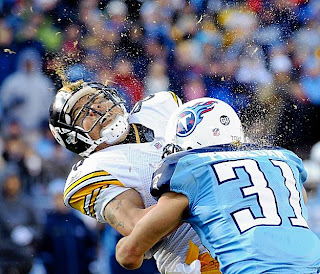Greens
Concussions in High School Sports
More than 750,000 Americans each year report injuries received during recreational sports, with 82,000 involving brain juries. Brain injuries cause more deaths than any other sports injury. Studies show that Emergency Room visits, for kids between the ages of 14 and 19 have more than tripled (Sports Activity After a Concussion Slows Recovery - NYTimes.com.). While awareness has increased, many parents, coaches and players don’t understand how serious concussions can be. Many players and sometimes even coaches and parents seem more concerned with when they can go back to sports. But when is too much simply too much? Everyone needs to pay more attention to concussions and how serious they are.
Concussions can cause permanent damage. “There’s strong evidence that children recover better’’ than adults from certain catastrophic brain injuries like strokes, as well from brain surgery, Dr. Giza said. ‘‘But concussions may be different,’’ he continued (Sports Activity After a Concussion Slows Recovery - NYTimes.com.). Concussions can cause many problems down the road. Some people who suffer from serious concussions can never live a normal life. Concussions can cause permanent brain damage, which causes mental problems (Sports Activity after a Concussion Slows Recovery - NYTimes.com).
High School athletes are more vulnerable for getting concussions. Younger kids play football or other sports that can cause concussions. 60,000 cases of concussions occur among high school students (Sports Activity after a Concussion Slows Recovery - NYTimes.com). Researchers believe young athletes may be more vulnerable than adults to lasting damage from these head injuries because their brains are still developing (http://www.dailyherald.com). One Rep. Bill Pascrell Jr., D-Paterson, NJ said “We’re playing Russian roulette with our children’s lives” (Sports Activity after a Concussion Slows Recovery). Concussions can affect a student’s performance in school. “They had suppressed attentional resources,” said Dr. Steven Broglio (Sports Activity after a Concussion Slows Recovery). A new study shows that student athletes who return to sports quickly after a concussion appear to have a slower brain recovery than teens that stay off the field longer (Sports Activity after a Concussion Slows Recovery - NYTimes.com). Students can have trouble concentrating in school("Heads Up": Concussions in High School Sports). Students may have trouble in class, which may cause failing grades which eventually might get them off the team ("Amnesia." The Gale Encyclopedia of Science).
However, some parents and coaches are saying that the doctors should be able to say if they can play or not. The doctors have the right tools, they say. Traditionally, the physician or school relies on the students' self-report on their symptoms (Heads Up": Concussions in High School Sports.). Athletes are reluctant to complain about any symptoms because they are scared to get pulled out of the game (Heads Up": Concussions in High School Sports).
Now, even some coaches are saying that they need the player for the next game because they simply don’t have enough players. They say that “they are fine for the next game.” Truth is, they are not. A new study shows that student athletes who return to sports quickly after a concussion appear to have a slower brain recovery than teens who stay off the field longer (Sports Activity After a Concussion Slows Recovery - NYTimes.com). Any ways, isn’t it better to miss just one game then miss next season?
If so much attention is being paid to concussions, why are coaches still playing players after they've suffered a couple concussions? Why aren’t more people concerned with this? 60,000 cases of concussions occur among high school students (Sports Activity after a Concussion Slows Recovery - NYTimes.com). Everyone has seen that numerous high school students that continue to play often get hurt worse or are even killed. People need to be more serious when it comes to concussions because they can cause permanent and life threating problems.
Works Cited:
"Amnesia." The Gale Encyclopedia of Science. Ed. K. Lee Lerner and Brenda Wilmoth Lerner. 4th ed. Detroit: Gale, 2008. Gale Student Resources in Context. Web. 24 Sept. 2010.
""Heads Up": Concussions in High School Sports." 3 Aug. 2004. Web. 28 Sept. 2010. <http://www.ncbi.nlm.nih.gov/pmc/articles/PMC1069089/>.
"Sports Activity After a Concussion Slows Recovery - NYTimes.com." Health and Wellness - Well Blog - NYTimes.com. Web. 30 Sept. 2010. <http://well.blogs.nytimes.com/2008/05/16/sports-activity-after-a-concussion-slows-recovery/>.







